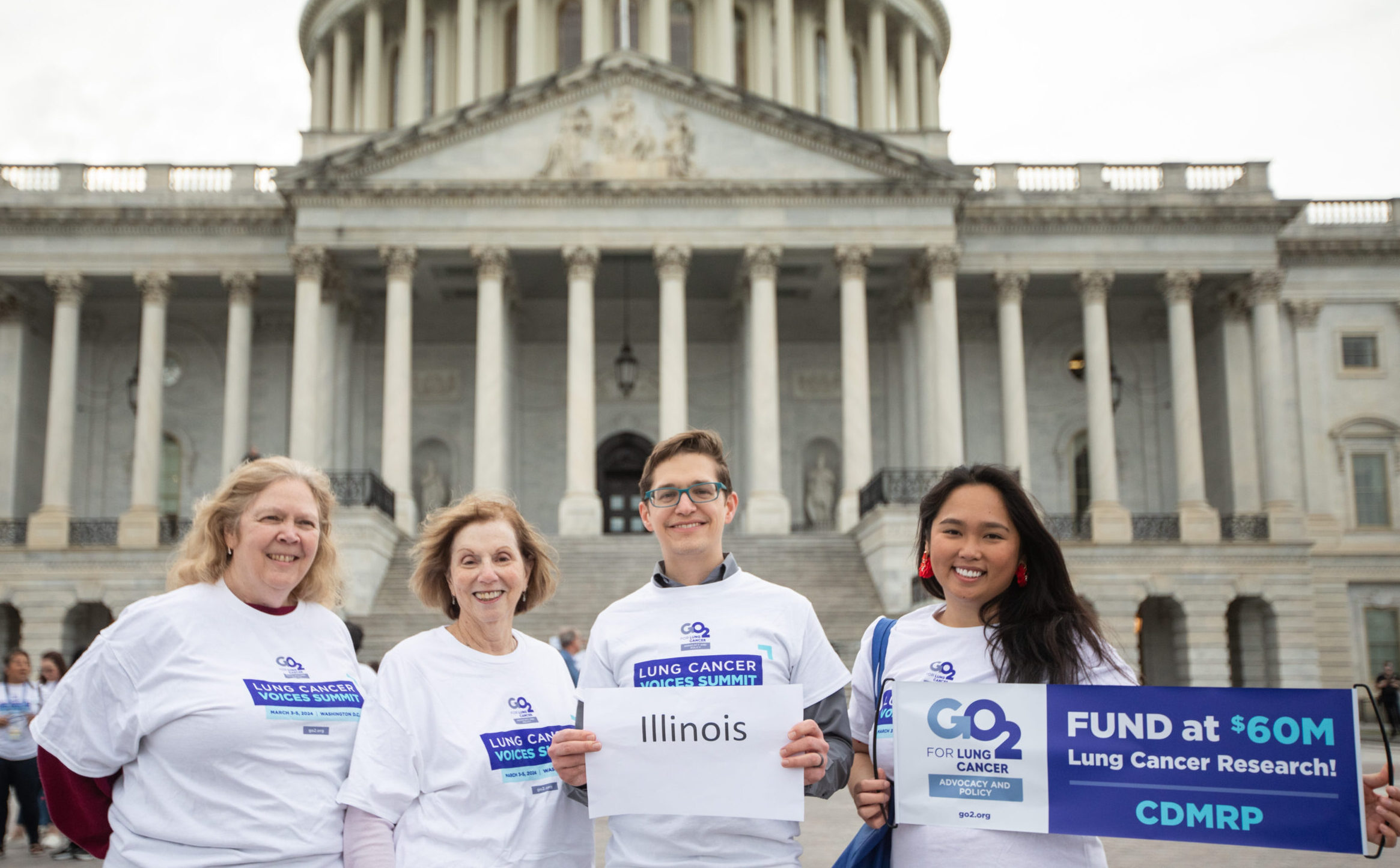
Terry G. lives in Plainfield, IL, where she likes to ride her motorcycle, play water volleyball, and make fused glass art pieces.
My diagnosis
In October 2003, when I was 41 years old, I needed to see a doctor for what I thought was a bad sinus infection. The problem was that I had just been laid off from a job where I had worked for 9 years and had yet to start my new job, so I didn’t have health insurance. My doctor told me not to worry about it and to come in anyway; they would work with me on the cost.
I had also developed a cough that was so dry and harsh that I would sometimes taste blood. I assumed that I was coughing so hard that I was making my throat bleed. My doctor was afraid I might have tuberculosis or pneumonia and suggested I have a chest X-ray. Once I did that, my life totally changed.
A surprise treatment option
The doctors saw lung cancer in both of my lungs, and initially told me it was inoperable. All my doctors saw me for no charge because I didn’t have insurance. They suggested that I start with chemotherapy and radiation, and maybe after that, I would be eligible for surgery. When I met with the surgeon, though, he said, “I can do this, and I don’t want to wait for other treatment because it can cause scarring, and it’s hard for me to see through the scars.”
I was so surprised. No one had ever discussed surgery with me, but here it was a Tuesday, and I was suddenly scheduled for surgery on Thursday. It happened so fast that it threw me into a tailspin. I hadn’t considered surgery, so when he suggested it, I was just blown away. I called my primary care provider (PCP) to ask her what to do, and she said, “Surgery is the best way. If they can get it out, you might live.” So, surgery it was.
When I was first diagnosed, the doctors told my family that I had a 3% chance of living to see my birthday 4 months later. After I had the surgery, my oncologist suggested doing radiation and then chemotherapy to clean up anything left over from the surgery. Even with all of that treatment, he still only gave me a 5% chance of surviving for 5 years. When they told me these statistics, I said, “Me and whoever is up there have a deal. I’m going to die on my own time, and it’s going to be in my 80s and in my sleep.”
And here I am, almost 21 years later.
Challenges with my care team
When I was going through radiation on my chest after my surgery, I asked the radiation oncologist, “How do you know that the cancer’s not anywhere else?” And he said, “Didn’t you get a PET scan?” I hadn’t. He sent me to get one, and I said, “You mean to tell me that they took my lung out, not knowing where else the cancer might be?” I didn’t know enough to ask those questions at the time, but it’s horrifying to me now. Luckily, the PET scan showed that the cancer wasn’t anywhere else in my body.
I also had an experience where, during my first chemo treatment, my legs felt like they had been hit by a truck. My nurse actually called me a “wuss,” if you can believe it. I was 41, everyone else in the room was 90, and I think they thought I was going to be tough or something. They were giving me a dose 3 times as potent as the normal one. During my second treatment, the same thing happened: my legs went numb from the waist down. It was the same thing through the third treatment too.
So, my doctor had me do a spinal tap to check for spinal cancer, which he suspected because of the numbness in my legs. I told him I was certain I didn’t have spinal cancer. He said to me, “Yes, you do.” And I said, “No, I don’t. And the test will prove it.” Of course, I didn’t have spinal cancer, the test proved it, and the doctor never, ever called me with the results.
Lingering health challenges
I feel very lucky to be here, but my survival has not come without some big challenges caused by my treatments. When I was first coming out of lung surgery, I couldn’t walk 5 feet without losing my breath. It was miserable. I remember thinking, “I felt so much better when I had cancer.” I was a rock climber, a swimmer, and a cyclist. After surgery, I couldn’t make it across the room. Two years into recovery, when I was still struggling, I told my pulmonologist, “This is not a good quality of life,” and he said, “Didn’t you do pulmonary rehab?” No one had ever mentioned it to me. But pulmonary rehab changed my life—it taught me how to bike again, how to breathe when the air hits my face while riding my motorcycle, and how to manage my breath enough to play water volleyball. These are things that once seemed impossible.
I also lost my left vocal cord during my lung surgery, and I couldn’t speak for 2 years. I couldn’t work because I couldn’t talk. I was in my early forties when this happened and in the prime of my career, and you really can’t ever get back to that level. I managed to get on disability at that time, and I’ve been on it ever since.
I had another surgery to prop up my left vocal cord so that my right one can bounce off it, and now I can speak better, but my voice is still a very big issue. I have a big personality, and I really love to shine, but so often now, no one can hear me. I can’t speak well in a group of people, and that makes you start to feel unnoticed. I also seem like a person who is withdrawn or doesn’t care because I don’t say a lot, but that’s not the real me at all. This is truly the most frustrating part of my whole journey. I feel like it’s completely changed how people understand and perceive me.
I have also had chronic and painful sciatica for 21 years, and there’s nothing doctors can do. They keep trying to push opioids on me, but I don’t want to take them. I do take Advil, but Advil doesn’t always work. For me, massage is the best because it calms it to the point where I can get 2 to 3 weeks of no pain. But insurance doesn’t cover massage, so I can’t always afford it.
The mental side of long-term survivorship
It’s been up and down for me mentally too. In the beginning, I was very depressed. I was alone, and started to think “Why me?” but I decided I didn’t want to live that way, so I found a way out.
The fear is never totally gone for me, though. If my toe hurts, I have cancer. If my wrist hurts, I have cancer. Five years after my treatment, my oncologist told me that I was cured, that I would be moving to annual scans, and that he was moving to a new hospital. That was terrifying to me. I cried because I felt like I was just thrown out there with no one looking out for me anymore.
I have met several people through my advocacy whose lung cancer has come back, and that makes me feel like I can never relax. I remember meeting a woman who was 9 years out from her diagnosis while I was also 9 years out from mine. She was diagnosed again at 9 years and passed away 5 months later. I know someone else who had a recurrence 24 years later. So, I never feel safe. Having my yearly scan still scares me. You never get over that.
Getting involved as a lung cancer advocate
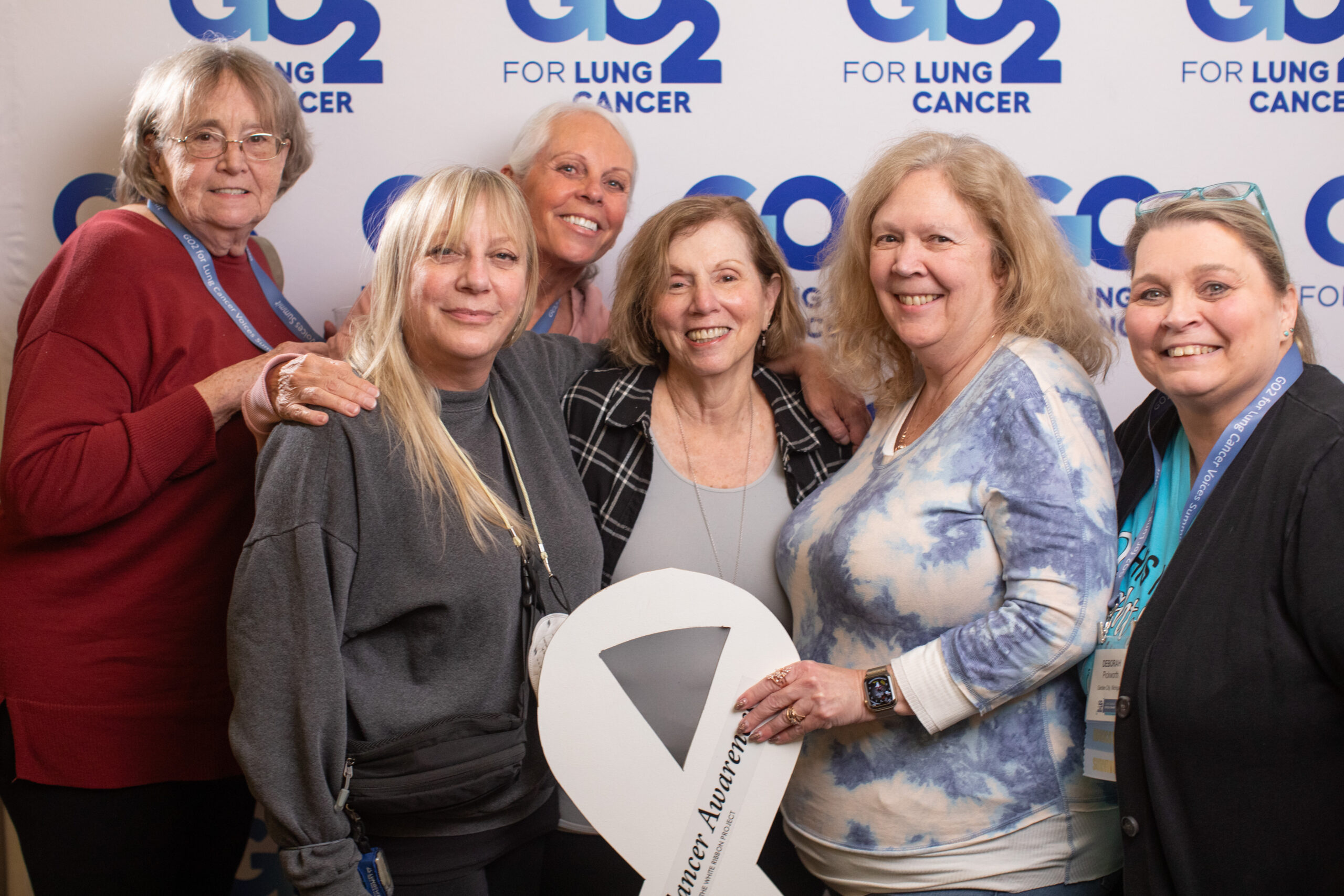 I started advocating right away, and I stay involved 20 years later because when I was diagnosed, I was alone with very little support from my family. My diagnosis freaked them out . Once I got through it, I swore that as long as I’m alive, no one else will feel as alone as I did. So, I talk to a lot of people who are newly diagnosed or who are struggling, and I try to be there for them and support them however they need it. If anyone needs anything, they can always contact me.
I started advocating right away, and I stay involved 20 years later because when I was diagnosed, I was alone with very little support from my family. My diagnosis freaked them out . Once I got through it, I swore that as long as I’m alive, no one else will feel as alone as I did. So, I talk to a lot of people who are newly diagnosed or who are struggling, and I try to be there for them and support them however they need it. If anyone needs anything, they can always contact me.
Someone once said that I was here for a reason—that I got lucky in so many ways for a reason—and I figure that reason is to make an impact in the lung cancer world. So that’s what I plan on doing.

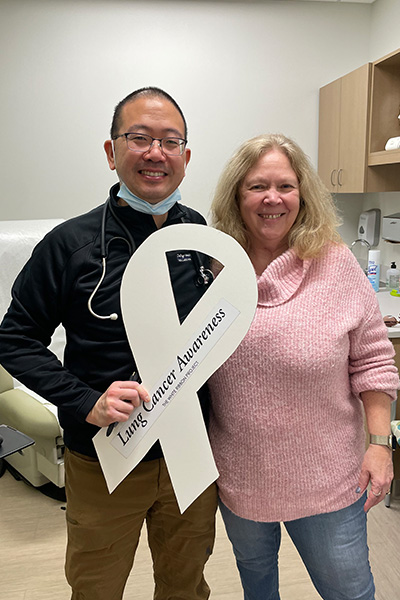
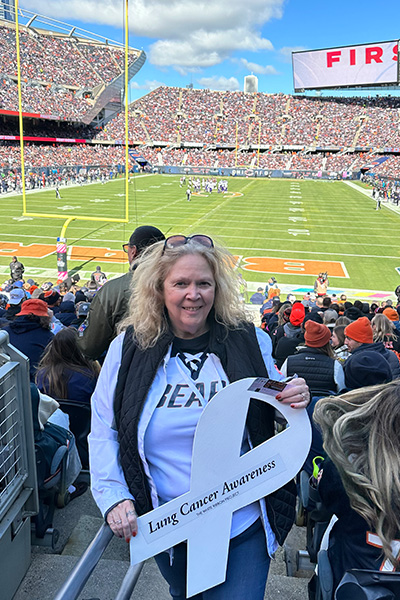


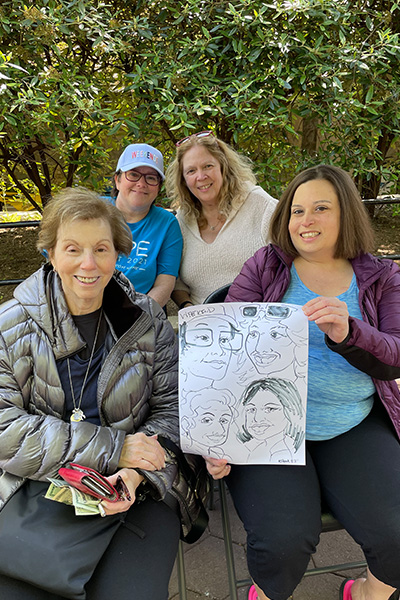
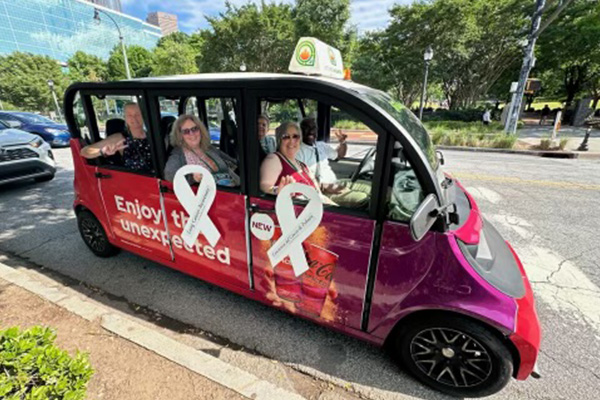


Wow! You just described the exact same mental & emotional coaster ride I’ve been on for the last 3 years. I work on my spirituality every day. My faith in Jesus Christ makes every day & everything a blessing. 🙏🏻 And I feel strong.
Terry,
I was diagnosed with lung cancer 10 years ago. I live in IL as well and the Northwestern Cancer Resouce Center is a great resource although they are located in Geneva and I think they have a place in Warrenville as well. You mention in the article that you feel better with a massage, One service they offer is massages (which are free) if you don’t mind driving that far. https://livingwellcrc.org/programs-and-services/touch-therapy/
Thank you for sharing your experience and I hope all goes well in the future.
Debbie
This is a wonderful testimony to the power of God and to Terry’s perseverance!
Despite all the hardships Terry endured, her determination to keep on fighting never stopped.
As cancer patients we need to learn from Terry about self advocacy!
Thank you Terry! May you be blessed with a lighter load and many more happy years to come!
Thank you for sharing your story! Like you, my NSCLC was diagnosed when I thought I had a bad cold or allergies (age 44). Keep going!
Hi Debbie!
We must meet someday soon! I am not sure I qualify for the free massage but it is definitely something to look into!
Thank you for sharing your knowledge!
Tmg41@hotmail.com. Would love to get together don’t want to leave phone number on here lol
Hi Debbie,
We must meet someday soon! I am not sure I qualify for the free massage but it is definitely something to look into!
Thank you for sharing your knowledge!
Tmg41@hotmail.com. Would love to get together don’t want to leave phone number on here lol
Hi Debra,
Thank you. I only hope that my story reaches whomever needs hope.
Terry
Hi Jennifer,
I know seems to be a common theme. Being so young the drs don’t usually look for lung cancer.
I am so happy you are doing well!
Terry